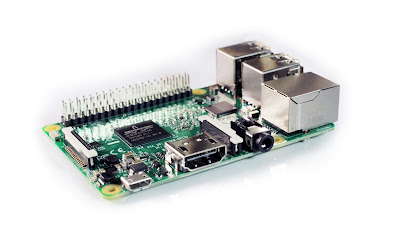Raspberry Pi
Raspberry Pi or the series of the smallest computer in the world. It is a small and single device which does not include any input-output device. The first model was the Raspberry Pi 1 B model which was first introduced in the United Kingdom.Various generations and models of the Raspberry Pi are upcoming in a few years.
The Raspberry Pi is the go-to microcomputer for all ages and abilities starting out in the wonderful world of programming and electronics.
BEST BUY LINK: https://amzn.to/3110DNG
BEST BUY LINK: https://amzn.to/3110DNG
There are three key models of Raspberry Pi on the market today - the Raspberry Pi 3 Model B+, Raspberry Pi Model A+and their tiny sibling the Raspberry Pi Zero. A Raspberry Pi is a computer.. a really small, really powerful, ‘micro’ computer. The latest Raspberry Pi 3 Model B+ includes a 1.4GHz quad-core processor, 1GB of RAM, WiFi, Bluetooth and more! With a highly-active community of forums, blogs, tutorials and learning materials available, learning how to code and make projects has never been easier! It’s also more accessible than ever thanks to the ultra-affordable Raspberry Pi Zero W. With the ability to use code to control real-world ‘things’ via the Raspberry Pi’s GPIO, there are endless projects to make - LED projects, robots, home automation, AI assistants, remote control cars, displays, camera projects, media centers, servers, cluster computers and much, much more!
Our ever-growing range of Raspberry Pi kits, accessories and add-ons are a great way to explore the Raspberry Pi further and make fun projects along the way.
Types of Raspberry Pi:
Till date, it has 5 generations and 11 models. The first generation (Raspberry Pi 1 Model B) was released in February 2012, followed by the simpler and cheaper Model A. In 2014, the Foundation released a board with an improved design, Raspberry Pi 1 Model B+.
These boards are approximately credit-card sized and represent the standard mainline form-factor. Improved A+ and B+ models were released a year later. A "Compute Module" was released in April 2014 for embedded applications. The Raspberry Pi 2, which added more RAM, was released in February 2015.
Raspberry Pi Zero
A Raspberry Pi Zero with smaller size and reduced input/output (I/O) and general-purpose input/output (GPIO) capabilities were released in November 2015 for US$5. By 2017, it became the newest mainline of Raspberry Pi.
Raspberry Pi Zero W
On 28 February 2017, the Raspberry Pi Zero W was launched, a version of the Zero with Wi-Fi and Bluetooth capabilities, for US$10. On 12 January 2018, the Raspberry Pi Zero WH was launched, a version of the Zero W with pre-soldered GPIO headers.
Raspberry Pi 3 Model B
Raspberry Pi 3 Model B was released in February 2016 with a 1.2 GHz 64-bit quad-core processor, onboard 802.11n Wi-Fi, Bluetooth, and USB boot capabilities.
Raspberry Pi 3 Model B+
On Pi Day 2018 the Raspberry Pi 3 Model B+ was launched with a faster 1.4 GHz processor and a three-times faster gigabit Ethernet (throughput limited to ca. 300 Mbit/s by the internal USB 2.0 connection) or 2.4 / 5 GHz dual-band 802.11ac Wi-Fi (100 Mbit/s). Other features are Power over Ethernet (PoE), USB boot and network boot (an SD card is no longer required).
Raspberry Pi 4 Model B
Raspberry Pi 4 Model B was released in June 2019 with a 1.5 GHz 64-bit quad-core ARM Cortex-A72 processor, on-board 802.11ac Wi-Fi, Bluetooth 5, full gigabit Ethernet (throughput not limited), two USB 2.0 ports, two USB 3.0 ports and dual monitor support (4K resolution). The Pi 4 is also powered via a USB-C port, enabling additional power to be provided to downstream peripherals, when used with an appropriate PSU. Three sizes of on-board RAM are available: 1 GB (US$35), 2 GB (US$45), 4 GB (US$55). The Raspberry Pi 4 has a design flaw where third-party e-marked USB cables, such as those used on Apple Macbooks, incorrectly identify it and refuse to provide power. This is expected to be corrected in a future board revision.




Comments
Post a Comment